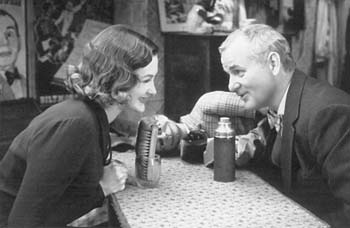![[Metroactive Movies]](/movies/gifs/movies468.gif)
[ Movies Index | Show Times | San Jose | Metroactive Central | Archives ]
 Talk Into the Thermos, Please: Joan Cusack and Bill Murray practice for their appearance before a Congressional hearing in Tim Robbins' 'Cradle Will Rock.' Staging the Past A crowd of actors resurrects '30s stage history in 'Cradle Will Rock' HALF THE WOMEN in the audience at Cradle Will Rock will want to kill director/writer Tim Robbins for not giving Frida Kahlo more than a couple of lines. I was ready to kill him myself for portraying Orson Welles (Angus MacFadyen) and his producer, John Houseman (Cary Elwes), as, respectively, a sloshed ham and an effete snob. Even if Robbins was trying to make a history of Depression-era Manhattan theater that wasn't dominated by great men, Welles' and Houseman's worst enemies couldn't ask for a broader caricature. Robbins has created a cinematic mural here, and more than a few of the historical personalities end up as sketches or cartoons. Cradle Will Rock is the story of the wildcat production of Marc Blitzstein's musical The Cradle Will Rock and the end of the WPA theater project at the hands of government critics who thought that it was a breeding ground for communists. Robbins directs zestfully, as if he figured he'd never get another chance to tell these stories and had to smash them all together right now, or else lose the material for good. Blitzstien's piece was heavily influenced by The Three-Penny Opera, and in fact, Robbins has composer Blitzstein (Hank Azaria, never better on screen) haunted by the spirit of Bertolt Brecht while he works. I wonder what happened to Kurt Weill's specter, because Blitzstien's score is especially indebted to that German composer. The original The Cradle Will Rock is still a fresh little piece of cabaret with a minimum of the bombastic, embarrassing side of political theater in it. The cycle of songs tells of a corrupt Steeltown and Mr. Mister, the mill's owner. You could call it biased ... but it does outline accurately how a company town used to keep the lid on the workers in the bad old days, through citizens' groups and coercion of professionals in the arts, the sciences, the police, the press and the local universities. Only snippets of the musical are visible in Robbins' behind-the-scenes story of the first production of Cradle Will Rock, a pro-union play that was, ironically, shut down by the stagehand's union's refusal to allow it to be performed. As thoroughly as this film was researched, Robbins is vague on these unpleasant labor details. The show was performed by nonprofessionals, played here by John Turturro as a desperately poor stagehand and Emily Watson as a destitute girl. Here, as in the upcoming Angela's Ashes, Watson is marvelous at expressing the shame of poverty--how it's meant to shame, meant to hurt. In smaller roles, there are some delightful turns, including Bill Murray in a parody of the old horror-movie bit about the deranged ventriloquist; the Cusacks (and how poorer the movies would be without them)--Joan playing a refined social worker and John as Nelson Rockefeller; Ruben Blades as a warm, funny, glinting-eyed Diego Rivera (neither Rockefeller nor Rivera had much to do with the main story, but there they are). It's a huge, feverish crowd of actors, and half the stories end clumsily. Yet Robbins does make way for the quiet moments--like Watson washing herself at a leaking fire hydrant--that make this historical picture wrong in the details but right in the spirit.
Cradle Will Rock (R; 134 min.), directed and written by Tim Robbins, photographed by Jean-Yves Escoffier and starring Hank Azaria, Joan and John Cusack, Cary Elwes, Bill Murray and Emily Watson, opens Friday at Camera 3 in San Jose and the Palo Alto Square. [ San Jose | Metroactive Central | Archives ]
|
From the January 13-19, 2000 issue of Metro, Silicon Valley's Weekly Newspaper.
Copyright © 1999 Metro Publishing Inc. Metroactive is affiliated with the Boulevards Network.
For more information about the San Jose/Silicon Valley area, visit sanjose.com.